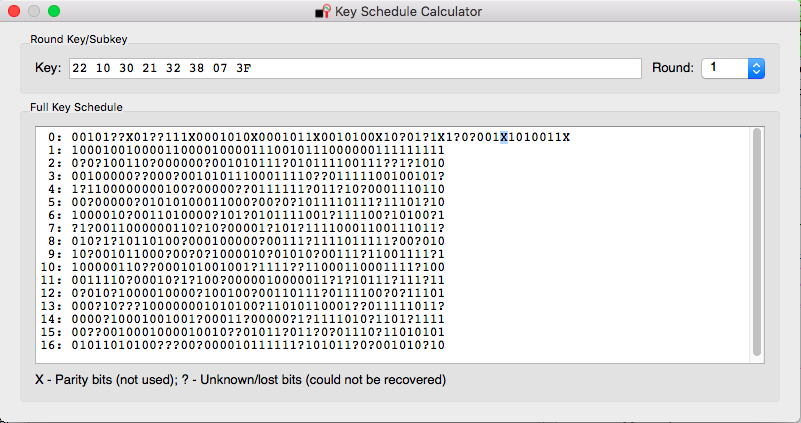| As of August 2020 the site you are on (wiki.newae.com) is deprecated, and content is now at rtfm.newae.com. |
Difference between revisions of "Tutorial B5-2 Breaking DES (Straightforward)"
(Tag: VisualEditor) |
|||
| (11 intermediate revisions by 3 users not shown) | |||
| Line 1: | Line 1: | ||
| + | {{Warningbox|This tutorial has been updated for ChipWhisperer 4.0.0 release. If you are using 3.x.x see the "V3" link in the sidebar.}} | ||
| + | |||
| + | {{Infobox tutorial | ||
| + | |name = B5-2: Breaking DES (Straightforward) | ||
| + | |image = | ||
| + | |caption = | ||
| + | |software versions = | ||
| + | |capture hardware = CW-Lite, CW-Lite 2-Part, CW-Pro | ||
| + | |Target Device = | ||
| + | |Target Architecture = XMEGA | ||
| + | |Hardware Crypto = No | ||
| + | |Purchase Hardware = | ||
| + | }} | ||
| + | |||
| + | |||
Follow the same procedure as in : [[Tutorial B5 Breaking AES (Straightforward)]], but: | Follow the same procedure as in : [[Tutorial B5 Breaking AES (Straightforward)]], but: | ||
| − | + | # Flashing the DES firmware to the target device (e.g. chipwhisperer/hardware/victims/firmware/simpleserial-des/simpleserial-des-xmega.hex), instead; | |
| + | # Setting an appropriate 'Total Samples' (e.g. 3500) and 'Offset' (e.g. 15500) in the ''Scope Settings''; | ||
| + | # Setting the 'Key Length (Bytes)', 'Input Length (Bytes)' and 'Output Length (Bytes)' to 8 bytes in the ''Target Settings''; | ||
| + | # Setting an appropriate 8 bytes Key in the ''Generic Settings (e.g. 2B 7E 15 16 28 AE D2 A6)''. | ||
| + | |||
| + | * Or, alternatively, execute the script "setup_cwlite_xmega_des.py" to perform steps 2-4 (you still need to perform step 1 yourself). | ||
| + | |||
| + | In the Analyzer, you'll need to modify the script to call the DES model instead of the AES model. This will mean: | ||
| + | |||
| + | <pre> | ||
| + | from chipwhisperer.analyzer.attacks.models.DES import DES, SBox_output | ||
| + | </pre> | ||
| + | |||
| + | And setting: | ||
| + | |||
| + | <pre> | ||
| + | leak_model = DES(SBox_output) | ||
| + | </pre> | ||
| + | |||
| + | See the example analyzer script for a complete listing of the required commands. | ||
| − | + | Note that the attack attemps to recover the [[wikipedia:File:DES-key-schedule.png|first round key]], which only has 48bits ([[wikipedia:File:DES-f-function.png|8 s-boxes x 6 bits each]]), while the original key has 56 significative bits (64 if we count the parity bits that are irrelevant). So, if we map the first round key, obtained after the attack, to the original key (you can use the provided DES Key Schedule Tool to do it), there will still be 8 bits missing (256 combinations). | |
| − | + | ||
| − | + | ||
| − | + | ||
| − | + | [[File:deskeyschedulecalc.png]] | |
| − | In | + | In this example, it matches the original key that was: |
| − | [[File: | + | [[File:key_des.png|801x801px]] |
| − | + | == Links == | |
| − | [[ | + | {{Template:Tutorials}} |
| + | [[Category:Tutorials]] | ||
Latest revision as of 10:45, 1 May 2018
This tutorial has been updated for ChipWhisperer 4.0.0 release. If you are using 3.x.x see the "V3" link in the sidebar.
| B5-2: Breaking DES (Straightforward) | |
|---|---|
| Target Architecture | XMEGA |
| Hardware Crypto | No |
| Software Release | V3 / V4 / V5 |
Follow the same procedure as in : Tutorial B5 Breaking AES (Straightforward), but:
- Flashing the DES firmware to the target device (e.g. chipwhisperer/hardware/victims/firmware/simpleserial-des/simpleserial-des-xmega.hex), instead;
- Setting an appropriate 'Total Samples' (e.g. 3500) and 'Offset' (e.g. 15500) in the Scope Settings;
- Setting the 'Key Length (Bytes)', 'Input Length (Bytes)' and 'Output Length (Bytes)' to 8 bytes in the Target Settings;
- Setting an appropriate 8 bytes Key in the Generic Settings (e.g. 2B 7E 15 16 28 AE D2 A6).
- Or, alternatively, execute the script "setup_cwlite_xmega_des.py" to perform steps 2-4 (you still need to perform step 1 yourself).
In the Analyzer, you'll need to modify the script to call the DES model instead of the AES model. This will mean:
from chipwhisperer.analyzer.attacks.models.DES import DES, SBox_output
And setting:
leak_model = DES(SBox_output)
See the example analyzer script for a complete listing of the required commands.
Note that the attack attemps to recover the first round key, which only has 48bits (8 s-boxes x 6 bits each), while the original key has 56 significative bits (64 if we count the parity bits that are irrelevant). So, if we map the first round key, obtained after the attack, to the original key (you can use the provided DES Key Schedule Tool to do it), there will still be 8 bits missing (256 combinations).
In this example, it matches the original key that was:

